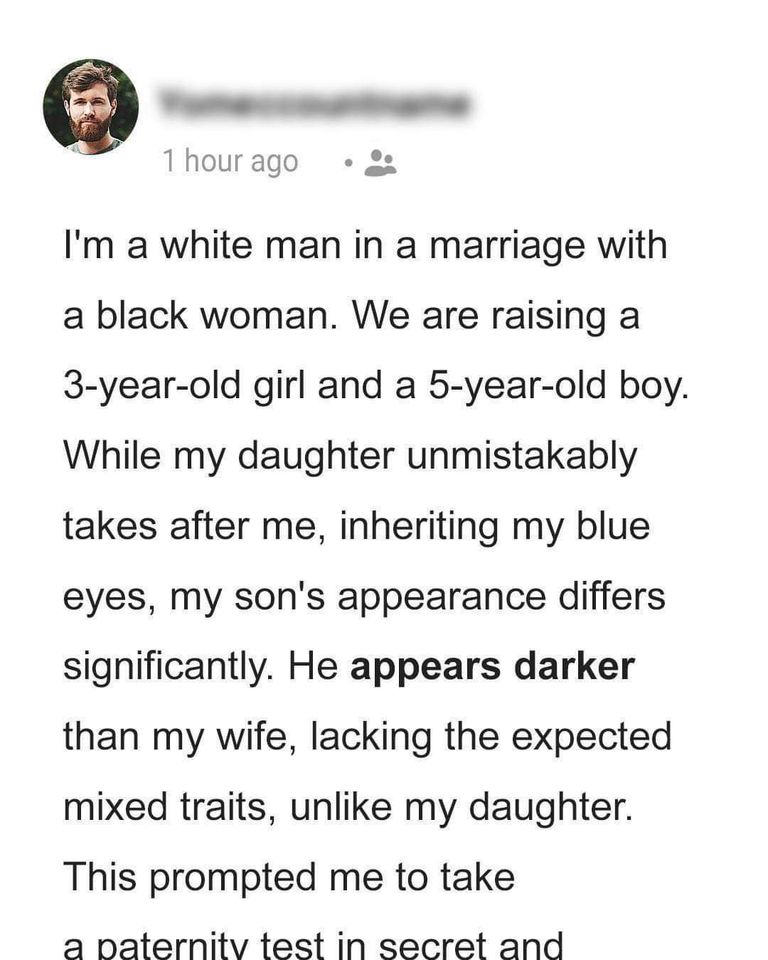I am a white man, married to a wonderful Black woman. We have two children: a three-year-old daughter and a five-year-old son. My daughter looks a lot like me, with my blue eyes and lighter complexion. But my son’s appearance surprised many people, even in our own family. He has darker skin than my wife, and he does not really have the usual mixed features you might expect. At first, I tried to ignore the comments from friends and coworkers who said things like, “Are you sure he’s yours?” But over time, their words got stuck in my head, making me wonder if something was not right.

I tried to talk myself out of my doubts. My wife is a caring, loyal person, and I have never had a real reason not to trust her. But the whispers from other people piled up, and eventually my mind could not rest. Every time I looked at my son, I felt guilty for even questioning his identity. Yet there was a nagging voice in my head telling me I needed to know the truth, no matter what.
Without telling my wife, I ordered a paternity test kit online. I felt awful about hiding something so big from her, but I convinced myself that if the results came back showing I was his father, then no harm would be done. Maybe I thought it would make me stop second-guessing every feature of my son’s face. So, one afternoon while my wife and children were out grocery shopping, I followed the kit’s instructions. I carefully swabbed the inside of my own cheek, then collected a sample from my son’s toothbrush. My heart pounded the whole time. I knew it was wrong to do this without talking to my wife, but my fear of the unknown pushed me forward.
I mailed the kit back and spent the next two weeks in a haze of anxiety. Every time my son smiled at me, I felt a rush of shame. When my wife asked why I was so quiet, I just said I was tired from work. I felt like a stranger in my own house, hiding a secret that could tear our family apart. Still, I told myself that once I got the results, everything would be clear. If I was indeed the father, I could throw the results away, bury the memory of my doubts, and move on.
Finally, an email arrived late one evening when my wife was putting the kids to bed. My stomach turned to knots as I opened the message. My eyes scanned the words, searching for the key sentence that would change my life forever. My breath caught in my throat when I read it: “The probability of paternity is 0%.” In other words, I was not my son’s biological father.
Everything around me seemed to fade. I felt dizzy and had to sit down. I stared at the screen, re-reading the words, hoping I had misunderstood. But no matter how many times I blinked, the result was still the same. All those whispers from other people came rushing back, and they felt like a thousand tiny knives. I felt betrayed, hurt, and furious, but also terrified. My wife and I had built a life together, yet now everything felt like a lie.
I had to find a way to keep myself from panicking. I decided I should speak to my wife when I was calm enough to listen to her side. Over the next few days, though, I struggled to act normal. I avoided looking my wife in the eye, afraid she might see the anger and doubt swirling in my mind. When she asked what was bothering me, I pretended I was just stressed about a project at work. The tension in our house grew, and my wife noticed my distant behavior. Even my daughter asked me why I was sad.
One night, I could not take it anymore. I told my wife we needed to talk, and we sat down at the kitchen table after the children went to bed. I could hardly form the words. I started by admitting I did something behind her back: I took a paternity test for our son without telling her. She looked shocked and hurt, her eyes filling with tears. She asked why I would do such a thing. I explained the doubts that had built up over time, the comments from other people, and the worry that kept gnawing at me.
Then, I showed her the test results. She stared at them, silent. After a long pause, she took a shaky breath and said, “I don’t understand. That can’t be right.” Her hands trembled as she looked me in the eye, tears running down her cheeks. She told me she had never been with anyone else. She promised she loved me and only me. “The test must be wrong,” she said.
I felt torn. The results were clear, but I trusted my wife’s honesty. Could there have been a mistake at the lab, or maybe the sample got mixed up? We decided to order another paternity test from a different company, to double-check. The waiting period this time felt even worse than before. Every day, I wrestled with the possibility of losing the family I cherished.
When the second test results arrived, I opened them with my wife by my side. We held our breath, each clutching one side of the printout. This time, it read, “Probability of paternity: 99.9%.” My eyes nearly popped out of my head. How was this possible? The first test said 0%. Now, this test claimed I was definitely the father. My wife started crying tears of relief, hugging me so tightly that it almost hurt. But I was still in shock, trying to understand what had happened.
We realized the first test must have been flawed—maybe there was a mix-up, or the sample I sent got contaminated. I felt a strange combination of shame and relief. Shame for doubting my wife and going behind her back, and relief that our family was still intact. Since then, we have talked a lot about trust. We both learned how dangerous it is to let other people’s comments and our own insecurities tear us apart. Our son may look different from what I first imagined, but he is still my child, and I love him with all my heart.
Now, I have a question for you: if you found yourself in a situation where one test said you were not the parent and another test said you were, how would you handle those conflicting results—and how would you repair the trust in your relationship?



